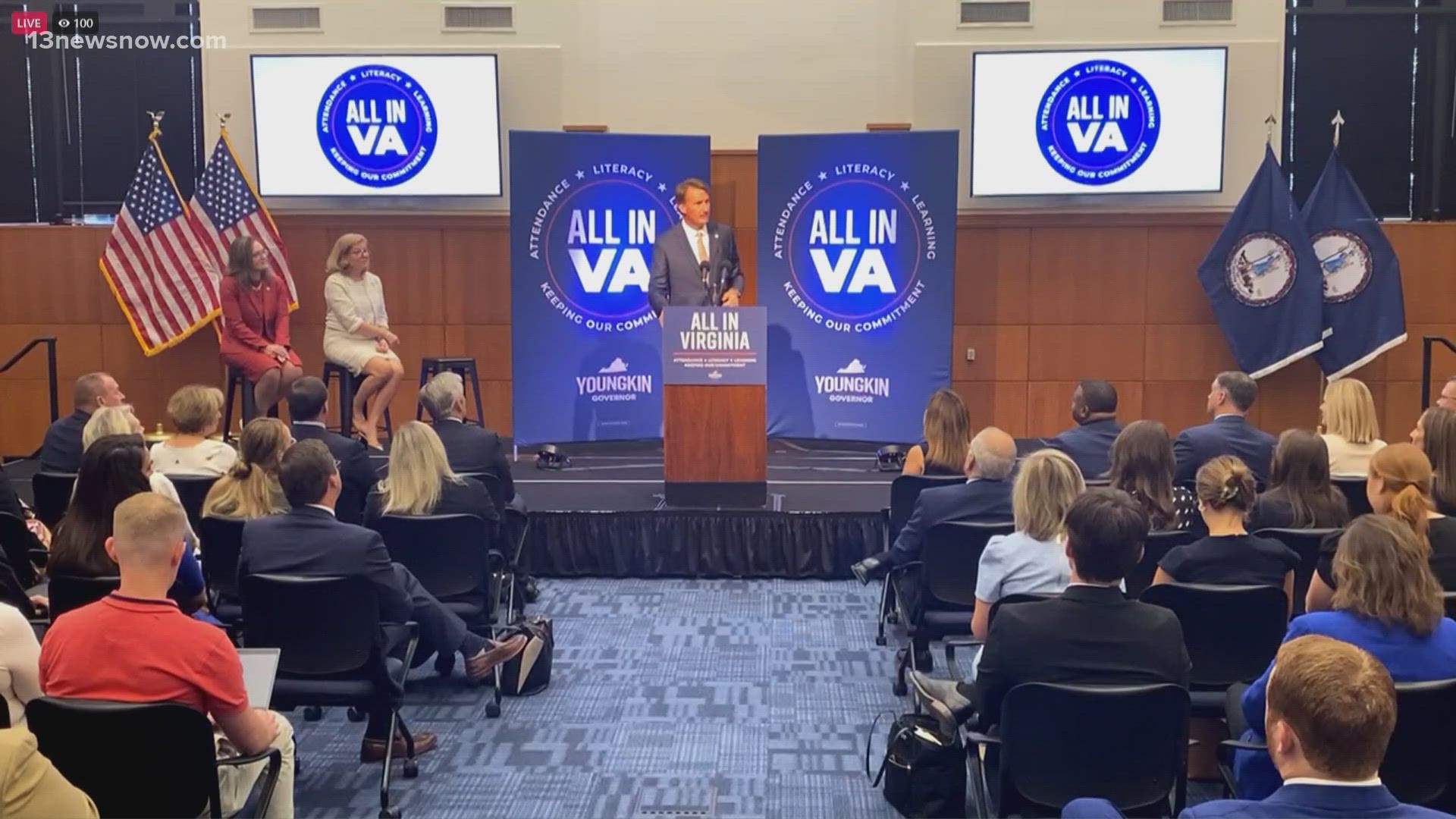NORFOLK, Va. — Virginia Governor Glenn Youngkin is rolling out a series of steps he believes will combat learning loss and chronic absenteeism, two things he says got worse during the pandemic.
He’s calling it "ALL in VA," with the “ALL” being "attendance, literacy and learning." The goal is to create task forces that combat absenteeism and implement “intensive tutoring” programs, all in place by October 16.
It comes as students begin the new school year and the public learns the results of last year’s Standards of Learning tests.
During a presentation Thursday, Youngkin -- alongside Secretary of Education Aimee Guidera and State Superintendent Lisa Coons -- said the latest SOL numbers show more than half of elementary and middle school students either failed or are “at risk” of failing their reading and math exams.
"Our students have fallen off track and they are struggling. They’re struggling developmentally, they’re struggling emotionally, they’re struggling academically," said Guidera.
They said high schoolers are fairing better than 3rd through 8th graders.
"Our third through eighth-grade students are not ready. They are behind where their pre-pandemic peers were," said Coons.
Youngkin also said chronic absenteeism in the Commonwealth nearly doubled from the 2018-2019 school year to the 2022-2023 school year, jumping from 9% to 17%. To be considered chronically absent, a student has missed at least 18 days (10%) of a school year.
In an attempt to change all of that, Youngkin wants to create task forces in each school division to find solutions for chronic absenteeism unique to the localities’ needs, including barriers related to transportation and health. The Virginia Department of Education will also create a recourse guide, or "playbook," to support local school divisions.
One school division in our area is already taking steps to combat chronic absenteeism, steps that are creating some controversy among parents.
Starting this school year, high school students in Williamsburg-James City County with at least nine absences in a semester automatically get a failing grade of 59 or lower in that class. The school division confirmed that this includes both excused or unexcused absences.
The three-pronged plan also implements free "intensive tutoring" programs for students failing or at risk of failing. Students will receive three to five hours of tutoring a week. Students who are "at risk" will receive tutoring for 18 weeks, while students who are failing will receive tutoring for up to 36 weeks.
A tutor herself and owner of The Learning Room, Jessica Bradley knows how much tutoring can help students catch up.
"In grades three through eight, that means they were in kindergarten through third when all of this happened. What we saw during that time period for those kids, is that they lost a lot of phonic skills. We're also seeing an issue where they don't necessarily have all the background knowledge that other cohorts of children would. They just missed out on a lot of experiences," she said. "Those types of things are going to become individualized in figuring out exactly which child knows what things and how we can grow from there."
She said even just in their summer sessions this year, they've seen a lot of progress.
"We’ve really made a huge push this summer session to expedite that growth and what that’s looking like so far for the data that’s coming out is we are exceeding our year and a half. We are at two years of growth in three months with some students."
Bradley also said tutoring not only builds academic skills but can also build confidence and motivation to learn. Finding the tutors will be up to the divisions, many of which already face a teacher shortage.
“We recognize that you can’t snap your finger and have all the tutors show up. And so we have to work hard in order to make sure that we create these resources. This is why this is 'all in.' This is why we have to come together and use our creativity in order to get people off the sidelines," said Youngkin.
The third part of Youngkin's plan is accelerating the expansion of the Virginia Literacy Act through eighth grade. That means more reading specialists and support. The governor said there is a playbook for schools and families to help with these new additions.
VDOE and Youngkin recommend school divisions allocate the $418 million allotted in the budget to address learning loss in three ways: approximately 70% for high-dose tutoring, 20% for Virginia Literacy Act acceleration, and 10% for chronic absenteeism response.
"We know we can do this together. We just have to make it happen. Attendance. Literacy. Learning," Youngkin told the crowd Thursday. "ALL in VA focuses on the foundational elements of education, attendance, literacy, and learning, and provides a playbook to school divisions to meet the needs of our students. The ALL in VA plan fosters collaboration and partnership between school divisions, our Department of Education, community leaders and most importantly, students and their parents. I challenge all of us to work together with urgency to create a brighter future and deliver the education our students in the Commonwealth were robbed of for far too long."
To read the policies in full, click here.
To watch Governor Youngkin's presentation in full, click here.

